Relationship Spread #1
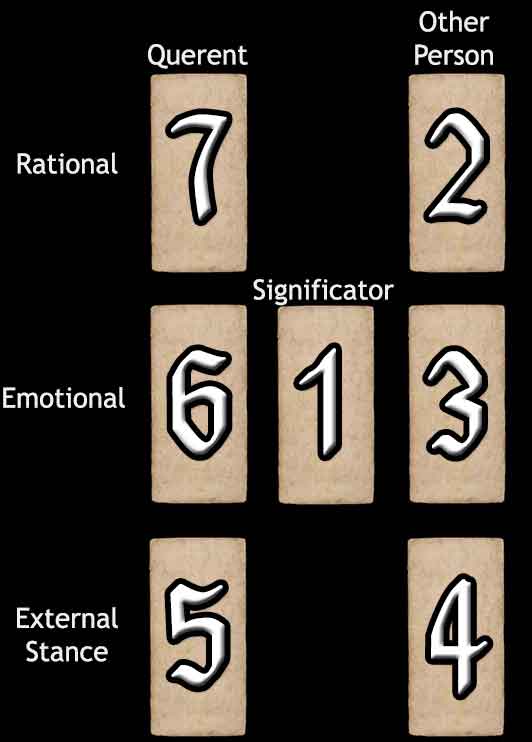
Difficulty: Easy
This tarot spread is easy to read, like a convenient chart. In this spread, court cards generally indicate actual people with the same characteristics. Knights (or corresponding princes, but not kings) and queens are meant to represent actual men and women in this tarot spread. Look for patterns in the cards as always.
Card #1 is the overall significator of the relationship. The two columns on either side of the significator characterise each individual's role in the relationship. The relationship does not have to be romantic. In fact, it could be a relationship between a person and a group, or even how two groups relate.
The top row, cards #7 & #2, is about the conscious thoughts of each person, or what they think about the relationship and likewise how they view their partner.
The middle row, cards #6 & #3, reveals the way each individual feels about the other. Emotional awareness corresponds to a person's unconscious thoughts that run deep, affecting a person in ways he or she is not fully aware of.
The bottom row, cards #5 & #4, represents the way each person behaves, in other words the stance taken regarding the relationship. The way a person acts may be genuine, but sometimes people are phony and manipulative, so it is best to weigh this card against the other person's cards to determine how they match up.
Your Relationship #1 Reading
You |
Other Person |
||
Thought |
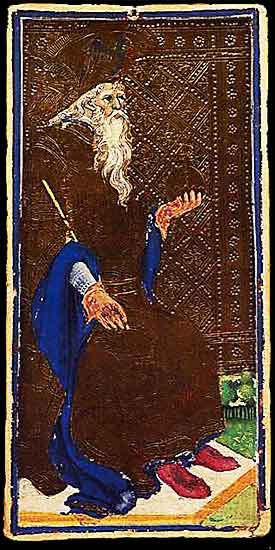 IV – The Emperor |
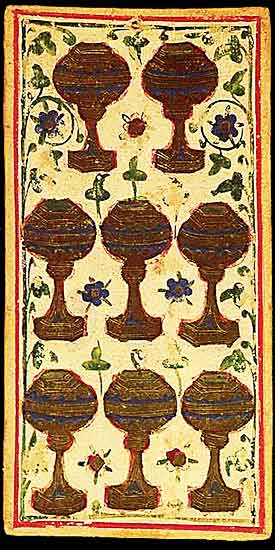 Eight of Cups |
|
Emotion |
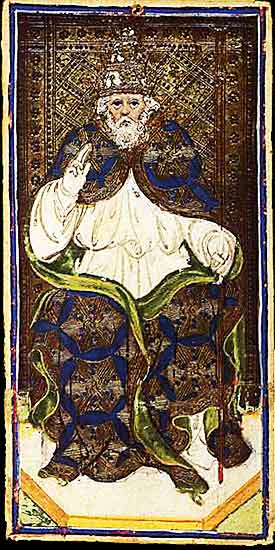 V – The Pope |
The Significator 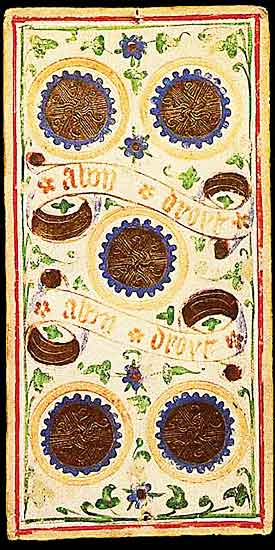 Five of Coins |
 XIX – The Sun |
External Stance |
 XI – Strength |
 Queen of Staves |

The Significator
Five of Coins
The Five of Coins signifies hardship, financial loss, and feelings of exclusion. It represents times of struggle or difficult circumstances, often related to material or financial difficulties. However, it also highlights the importance of seeking help and support during challenging times.
Symbolism: The crossing arrangement of the five coins creates a sense of imbalance and struggle. Their positioning highlights uncertainty and the need for external help or support.
In Relationships: Feeling abandoned or unsupported. The Five of Coins suggests financial or emotional hardship and the need for mutual care and compassion.
In Work: Financial difficulty or job insecurity. This card calls for resourcefulness and suggests seeking help or guidance during tough times.
Spiritually: A sense of spiritual poverty or abandonment. The Five of Coins reminds you to seek support and remember that even in difficult times, there is a way forward.
When ill-dignified: Isolation, despair, or neglect. The Five of Coins warns against wallowing in difficulty without reaching out for assistance or hope.

The Querent's Thoughts
IV – The Emperor
The Emperor symbolises structure, authority, and stability. He represents the power of rules and order to create security and success, though sometimes at the expense of flexibility.
Symbolism: Seated upright with a sceptre and orb, the Emperor exudes control and dominion. His luxurious robes and the golden background emphasise his regal and unshakable power. His stillness reflects his role as a protector of order and enforcer of discipline.
In Relationships: A relationship built on structure and commitment. It can suggest the presence of a protective partner or the need to establish boundaries.
In Work: Leadership, organisation, and discipline are essential for achieving success. The Emperor encourages taking control and assuming responsibility.
Spiritually: The Emperor teaches the importance of structure and discipline in spiritual practice, encouraging grounded growth.
When ill-dignified: Tyranny, rigidity, or abuse of power. It warns against controlling behaviours or excessive adherence to rules.

The Other Person's Thoughts
Eight of Cups
The Eight of Cups represents emotional departure, seeking something deeper, and the decision to walk away from what no longer serves you. It speaks to the need for introspection and self-discovery, as you leave behind the superficial in search of deeper meaning.
Symbolism: The eight chalices in staggered rows suggest a gradual departure or transition. The placement emphasises movement and emotional progression. The ornate details of the cups reflect the emotional investment required to make this decision.
In Relationships: A decision to move on from a relationship or emotional situation that no longer fulfils you. This card represents a quest for deeper connection or personal growth.
In Work: Leaving behind a job or situation that no longer aligns with your values or goals. The Eight of Cups suggests you are ready to pursue something more meaningful.
Spiritually: The journey towards deeper spiritual fulfilment. This card invites you to leave behind outdated beliefs or practices in search of greater understanding.
When ill-dignified: Running away from emotional problems or avoiding growth. The Eight of Cups warns against making impulsive decisions or leaving before you've fully processed emotions.

The Querent's Emotions
V – The Pope
The Pope represents tradition, spiritual authority, and shared values. He embodies the connection between divine wisdom and earthly institutions, urging adherence to established principles.
Symbolism: The Pope's raised hand conveys blessing, while his staff with a triple cross represents divine authority. The kneeling figures at his feet highlight devotion and the transmission of sacred teachings. The symmetrical composition and golden background reinforce his role as a stabilising spiritual guide.
In Relationships: A union founded on shared values or traditions. It may suggest the influence of societal expectations on relationships.
In Work: Success comes through adherence to established systems or mentorship from a trusted authority figure.
Spiritually: The Pope urges respect for spiritual traditions and the wisdom passed down through generations.
When ill-dignified: Dogma, blind conformity, or resistance to innovation. It cautions against rigid adherence to outdated ideas.

The Other Person's Emotions
XIX – The Sun
The Sun represents vitality, clarity, and joyful achievement. It signifies success, enlightenment, and the unyielding energy of optimism and truth.
Symbolism: The child holding the radiant red head is a symbol of pure, untainted joy and triumph. The energetic movement of the figure contrasts with the calm, golden background, reflecting the vitality and dynamic energy of the Sun. This is a card of achievement, where obstacles are overcome through innocence, optimism, and a radiant spirit.
In Relationships: The Sun brings clarity and happiness. It suggests a time of positivity, joy, and mutual growth, where the light of truth shines on all interactions.
In Work: Success and fulfilment are on the horizon. The Sun encourages you to take confident action and bask in the warmth of your accomplishments.
Spiritually: Enlightenment and clarity. The Sun symbolises spiritual illumination, urging you to embrace your true self and the divine light within you.
When ill-dignified: Overconfidence, arrogance, or an inability to see things clearly. The Sun reversed may signal excess or an inflated ego, blinding one to the truth.

The Querent's External Stance
XI – Strength
Strength symbolises courage, patience, and the mastery of inner power. It reflects the triumph of compassion and self-control over brute force.
Symbolism: The figure's calm restraint of the lion reflects the balance of strength and gentleness. Her finely detailed garments and the rendering of the lion's mane reflect Renaissance artistry, while the golden background elevates the scene to a symbolic level.
In Relationships: A time to practise patience and understanding. Strength signals harmony through compassion.
In Work: Success through persistence and confidence. Strength encourages inner resolve rather than aggressive tactics.
Spiritually: Strength represents mastering the ego and cultivating inner peace through compassion.
When ill-dignified: Aggression, self-doubt, or weakness. It warns against succumbing to fear or forceful behaviours.

The Other Person's External Stance
Queen of Staves
The Queen of Staves represents charisma, confidence, and leadership. She embodies the qualities of grace, strength, and warmth, guiding others with her inner fire.
Symbolism: The Queen, holding her staff with both hands, radiates elegance and power. Her rich gown and contemplative expression show a balance between intellect and intuition. The textured tapestry-like background reinforces her high status, while her poised presence speaks to her command of both the material and spiritual realms.
In Relationships: A strong and supportive presence. The Queen of Staves suggests you bring warmth, confidence, and leadership to your partnership.
In Work: Leadership, creativity, and confidence in your work. This card signals that you are in a position of authority, capable of inspiring and guiding others.
Spiritually: The Queen of Staves encourages you to embrace your spiritual strength and leadership, trusting your intuition and inner wisdom.
When ill-dignified: Dominance, arrogance, or possessiveness. This card warns against being controlling or letting your confidence turn into stubbornness.